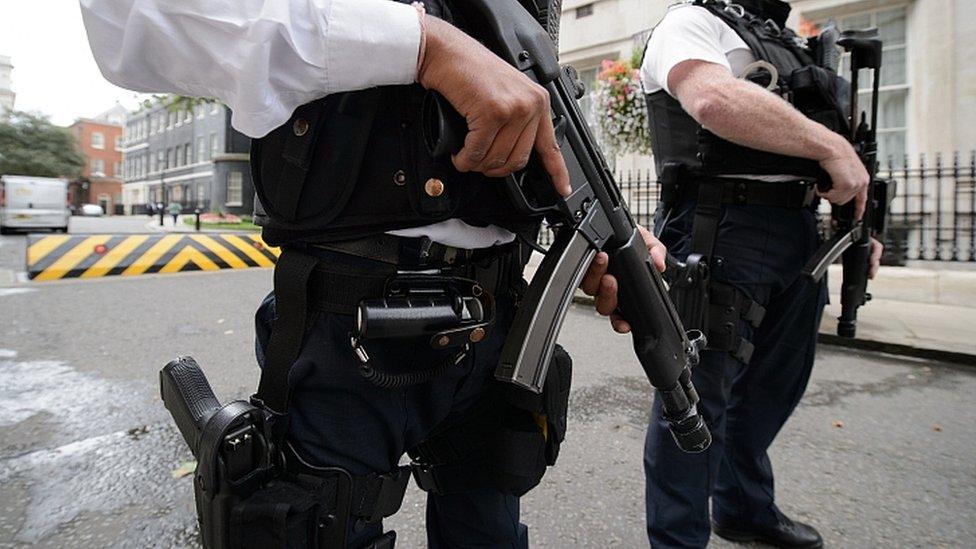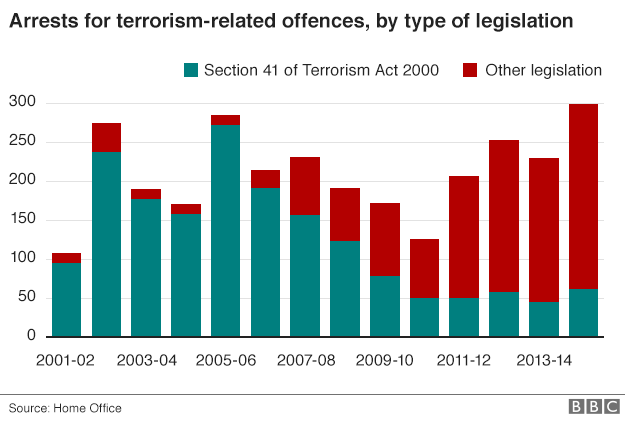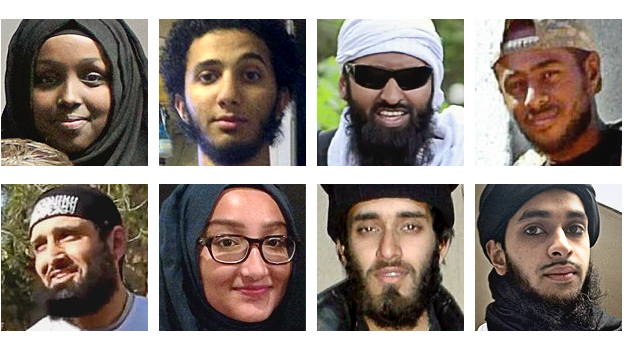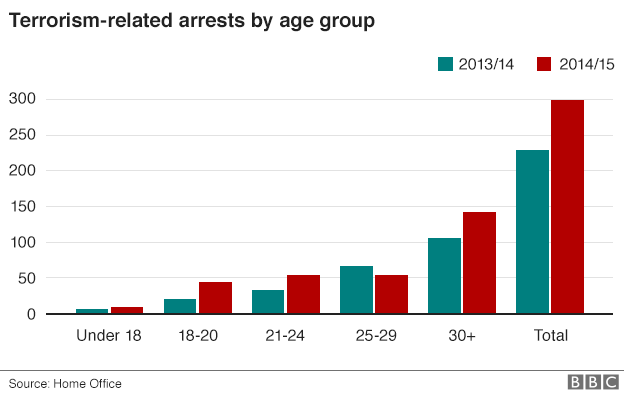Analysis: Record terror arrests - and younger too
- Published
- comments

Armed police in Downing Street
Amid headlines about terrorism and Syria, how easy it is to measure what's really going on?
For fairly obvious reasons, neither MI5 or their detective counterparts give the public a daily briefing on what they are up to - but their work surfaces every time there is an arrest.
The latest quarterly statistics from the government show how much the picture has changed in little over four years since Syria began its slide into chaos.
In the year to the end of March, 299 people were arrested for terrorism-related offences - up a third on the previous year and, crucially, the highest number since the government began formally collecting data since 2001.
Provisional police figures for arrests in the year to 1 July indicate that formal record has already been surpassed by reaching 372.

Arrests initially began to rise after 9/11 as the security services began to shift resources from Northern Ireland (as its peace process moved slowly forwards) towards identifying al-Qaeda-inspired extremists.
Within a few years there were a series of arrest spikes as major bomb plots were foiled - and then a substantial jump in the wake of the 7/7 London attacks. That year had been the highest on record, with 284 arrests, until today.
The trend then began to fall as the threat from al-Qaeda-inspired extremism appeared to decline. Its leadership was on the back foot - many of them detained, dead or in hiding - and increasingly struggling to maintain contact with would-be recruits in the West.
Back here in the UK, we were still witnessing one or two very serious court cases a year involving substantial allegations of plots to bomb and kill.
The two most serious cases led to the only terrorism murders the UK has suffered since 7/7 - Fusilier Lee Rigby in Woolwich and Muslim grandfather Mohammed Saleem, killed in the street by a neo-Nazi who then tried to bomb three mosques.
Syria has changed everything.
When the jihadists began moving into Syria - and their would-be recruits began arriving from the West - the arrests began to rise.
Just over 18 months ago, the Crown Prosecution Service made clear that anyone joining Syria's conflict risked prosecution because the UK's definition of terrorism includes acts of violence committed overseas. And the figures have shown how that policy has since been pursued.

Tracking Britain's jihadists: Unique BBC News database

It includes the stories of:
Those who are reported to have died
Those who have returned and been convicted by the courts in England
Many others we have established to be alive and active in Syria or Iraq

Not everyone who is arrested in a terrorism-related investigation is held under the special laws that allow detention without charge for 14 days. In 2006, almost all terrorism arrests were under this power which, at the time, allowed detention for 28 days. Today, four-fifths of arrests are under standard police powers which typically require charge or release within 24 hours, external. Standard arrest powers are useful to police if detectives want to use bail to free someone but restrict their activities - such as foreign travel - while they continue to investigate.
However, that is not the whole story. While the number of people held under Terrorism Act arrest powers has fallen, the time they are being held has crept up again. In 2013/15 just one person was held for more than seven days, In the last year, 21 people were held for more than a week. Fifteen of them were subsequently charged. That's the highest proportion of people detained for more than seven days since 2001.
In 2013, some 55% of arrests led to a charge - and the latest report from the Independent Reviewer of Terrorism Legislation, external, David Anderson QC, shows that charge-rate ticked up to 86% in 2014.
There is sometimes a considerable lag between arrest and charge because of the nature of today's investigations. Many are specifically related to travel to Syria or radicalisation or incitement of others. Charging decisions in these cases often involve complex and lengthy analysis of social media trails or other hunts for evidence. So it's not uncommon for someone to be arrested, see their phone data copied, and then to be bailed while police investigate, without the added pressure of a custody clock ticking away on the desk.
The outcomes of those prosecutions can be quite complex to break down because, in some cases, a trial can take a year to go before a jury.
But of the 35 people tried in the year to March, 33 of them were convicted - and 31 of those were specifically for offences under terrorism legislation.
This prosecution data will change very rapidly in the coming weeks because there are at least a dozen major prosecutions due to come before juries before the new Year. Almost all of these cases involve allegations of links one way or another to Syria.
More women and younger too
Two final thoughts about the data that has come out today that says something about the long-term trend.
The BBC's unique public database which tracks the Britons who have gone to Syria specifically to join jihadist fighting is a sea of very young faces - and quite a few women too - and the arrest data back home backs that up.

The proportion of those being arrested in the UK who are women has been slowly rising since 9/11. In the decade after figures began to be collected, around 7% of all those held were female - a figure that has now notched up to 12%. The 35 women held in the last year is the highest figure on record and a great deal of that is down to allegations of travel to Syria - or assisting others.
On age, while there has been an increase in arrests across all age groups, except those in their late 20s, the average age has been falling. The number of 18 to 20-year-olds arrested has more than doubled from 20 to 43.
This should come as absolutely no surprise to anyone who has been following how the internet is changing how we understand and react to global events.
The original revolutionary jihadist creed of 20 years ago, and its transmission, greatly relied on personal contacts and experience, kinship and study circles.
Friendship will also have a fundamental role in radicalisation - but the ideological message that underpins today arrives, unmediated, in the smartphones of the young.